BS4S14 Research Methods: Managerial Control, Employee Commitment
VerifiedAdded on 2022/08/15
|25
|6899
|14
Report
AI Summary
This research report investigates the effect of managerial control on employee affective commitment within the context of hotel small businesses in Jamaica. The study aims to explore the impact of owner-manager control types on employee commitment levels, examining conditions that influence the relationship and identifying specific managerial controls that affect commitment. The report includes a comprehensive literature review covering managerial control, affective commitment, and social exchange theory, establishing a conceptual framework to guide the research. The methodology section outlines the research design, and the findings are presented based on the analysis of collected data. The research addresses key questions about the relationship between managerial practices and employee commitment, offering valuable insights for leadership and management in the hospitality industry. The report concludes with a discussion of the implications of the findings and suggestions for future research.
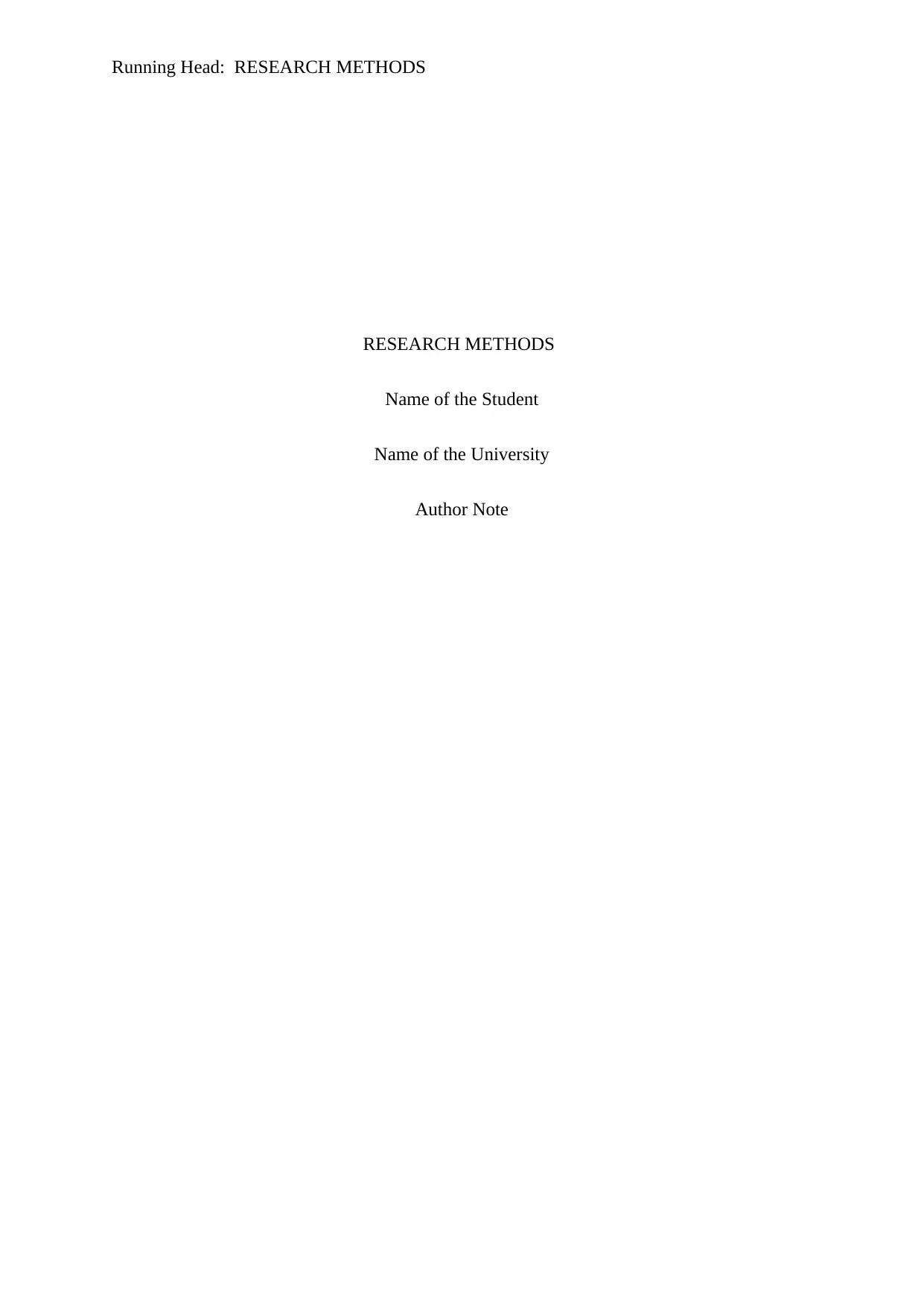
Running Head: RESEARCH METHODS
RESEARCH METHODS
Name of the Student
Name of the University
Author Note
RESEARCH METHODS
Name of the Student
Name of the University
Author Note
Paraphrase This Document
Need a fresh take? Get an instant paraphrase of this document with our AI Paraphraser
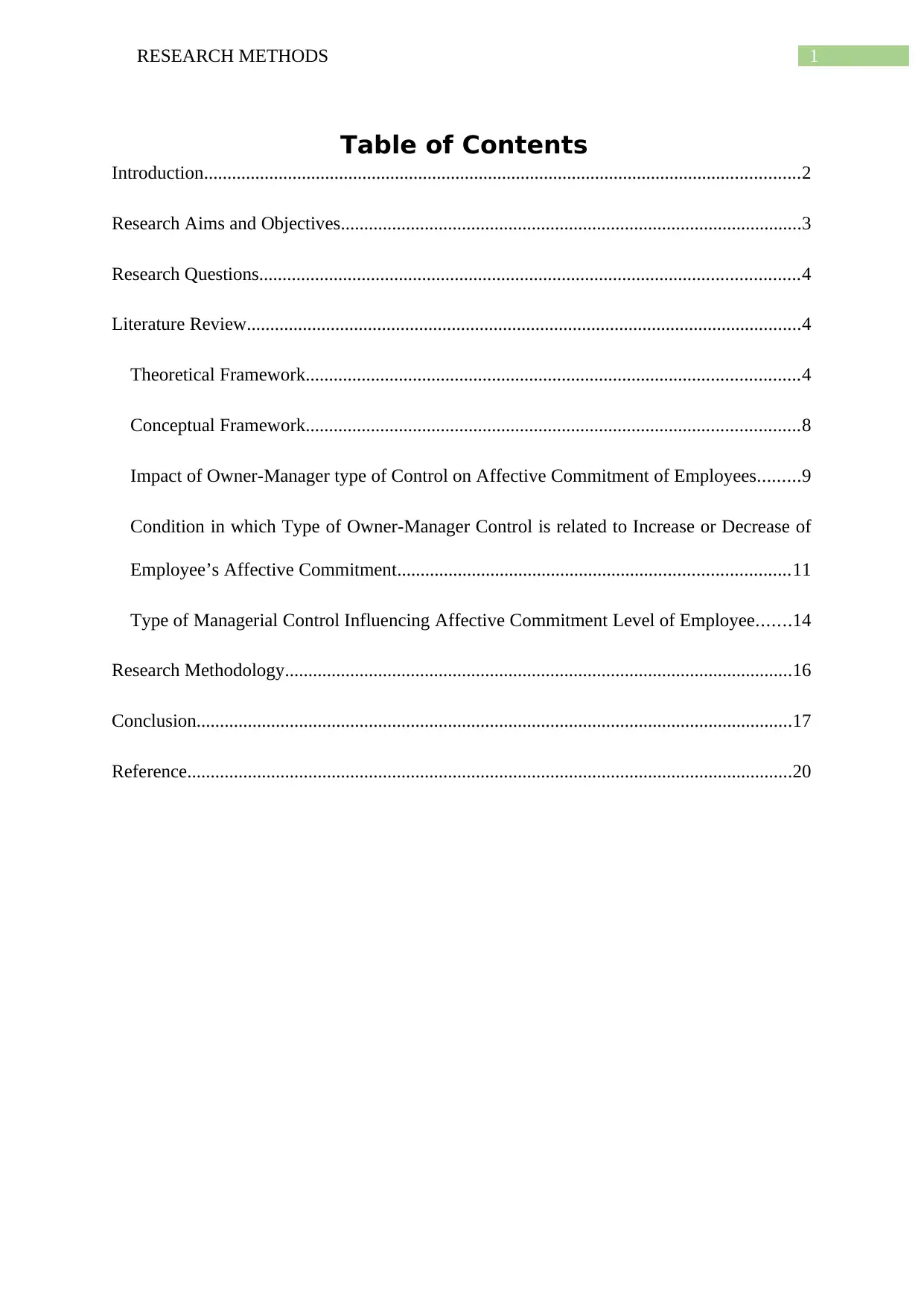
1RESEARCH METHODS
Table of Contents
Introduction................................................................................................................................2
Research Aims and Objectives...................................................................................................3
Research Questions....................................................................................................................4
Literature Review.......................................................................................................................4
Theoretical Framework..........................................................................................................4
Conceptual Framework..........................................................................................................8
Impact of Owner-Manager type of Control on Affective Commitment of Employees.........9
Condition in which Type of Owner-Manager Control is related to Increase or Decrease of
Employee’s Affective Commitment....................................................................................11
Type of Managerial Control Influencing Affective Commitment Level of Employee.......14
Research Methodology.............................................................................................................16
Conclusion................................................................................................................................17
Reference..................................................................................................................................20
Table of Contents
Introduction................................................................................................................................2
Research Aims and Objectives...................................................................................................3
Research Questions....................................................................................................................4
Literature Review.......................................................................................................................4
Theoretical Framework..........................................................................................................4
Conceptual Framework..........................................................................................................8
Impact of Owner-Manager type of Control on Affective Commitment of Employees.........9
Condition in which Type of Owner-Manager Control is related to Increase or Decrease of
Employee’s Affective Commitment....................................................................................11
Type of Managerial Control Influencing Affective Commitment Level of Employee.......14
Research Methodology.............................................................................................................16
Conclusion................................................................................................................................17
Reference..................................................................................................................................20
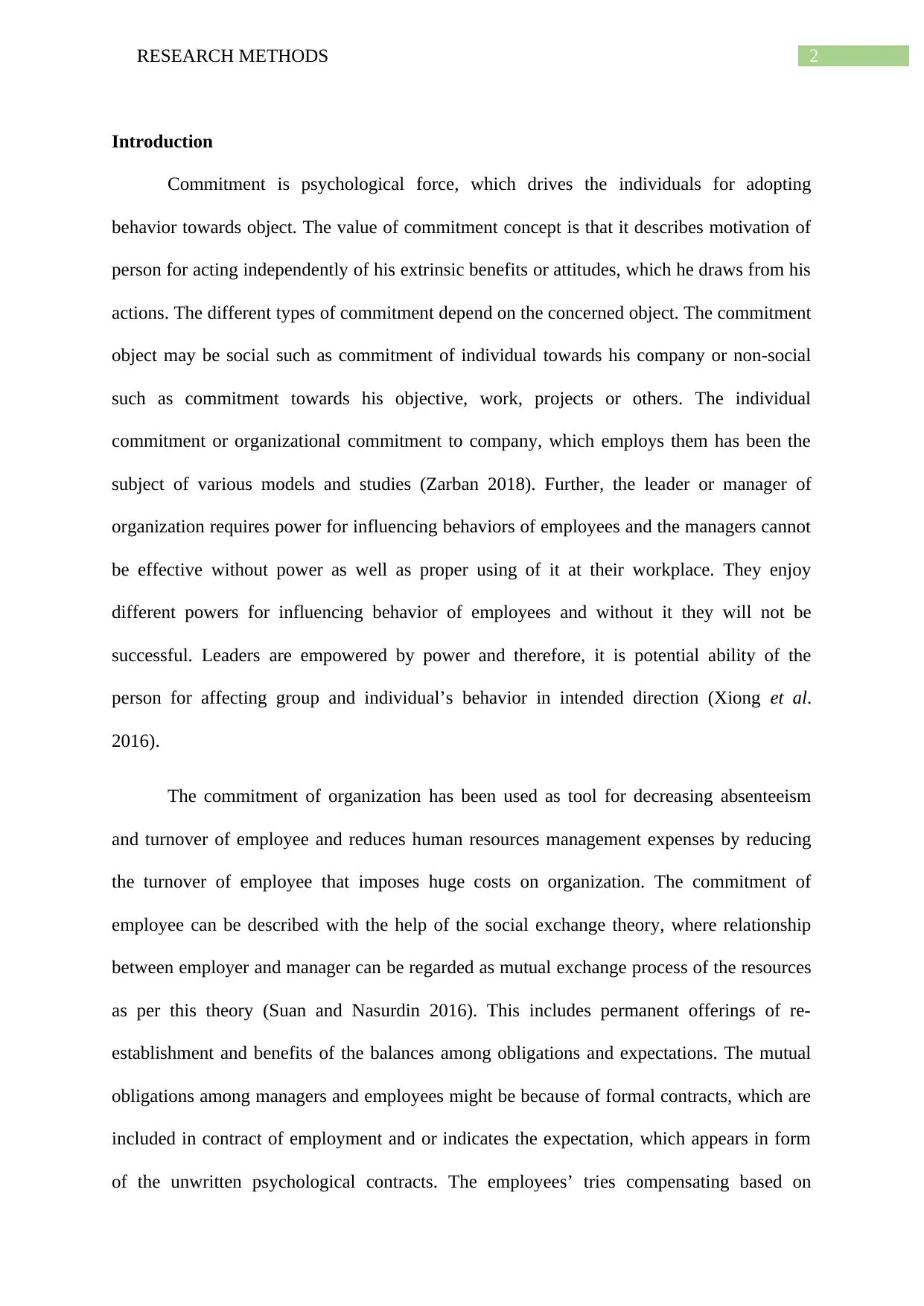
2RESEARCH METHODS
Introduction
Commitment is psychological force, which drives the individuals for adopting
behavior towards object. The value of commitment concept is that it describes motivation of
person for acting independently of his extrinsic benefits or attitudes, which he draws from his
actions. The different types of commitment depend on the concerned object. The commitment
object may be social such as commitment of individual towards his company or non-social
such as commitment towards his objective, work, projects or others. The individual
commitment or organizational commitment to company, which employs them has been the
subject of various models and studies (Zarban 2018). Further, the leader or manager of
organization requires power for influencing behaviors of employees and the managers cannot
be effective without power as well as proper using of it at their workplace. They enjoy
different powers for influencing behavior of employees and without it they will not be
successful. Leaders are empowered by power and therefore, it is potential ability of the
person for affecting group and individual’s behavior in intended direction (Xiong et al.
2016).
The commitment of organization has been used as tool for decreasing absenteeism
and turnover of employee and reduces human resources management expenses by reducing
the turnover of employee that imposes huge costs on organization. The commitment of
employee can be described with the help of the social exchange theory, where relationship
between employer and manager can be regarded as mutual exchange process of the resources
as per this theory (Suan and Nasurdin 2016). This includes permanent offerings of re-
establishment and benefits of the balances among obligations and expectations. The mutual
obligations among managers and employees might be because of formal contracts, which are
included in contract of employment and or indicates the expectation, which appears in form
of the unwritten psychological contracts. The employees’ tries compensating based on
Introduction
Commitment is psychological force, which drives the individuals for adopting
behavior towards object. The value of commitment concept is that it describes motivation of
person for acting independently of his extrinsic benefits or attitudes, which he draws from his
actions. The different types of commitment depend on the concerned object. The commitment
object may be social such as commitment of individual towards his company or non-social
such as commitment towards his objective, work, projects or others. The individual
commitment or organizational commitment to company, which employs them has been the
subject of various models and studies (Zarban 2018). Further, the leader or manager of
organization requires power for influencing behaviors of employees and the managers cannot
be effective without power as well as proper using of it at their workplace. They enjoy
different powers for influencing behavior of employees and without it they will not be
successful. Leaders are empowered by power and therefore, it is potential ability of the
person for affecting group and individual’s behavior in intended direction (Xiong et al.
2016).
The commitment of organization has been used as tool for decreasing absenteeism
and turnover of employee and reduces human resources management expenses by reducing
the turnover of employee that imposes huge costs on organization. The commitment of
employee can be described with the help of the social exchange theory, where relationship
between employer and manager can be regarded as mutual exchange process of the resources
as per this theory (Suan and Nasurdin 2016). This includes permanent offerings of re-
establishment and benefits of the balances among obligations and expectations. The mutual
obligations among managers and employees might be because of formal contracts, which are
included in contract of employment and or indicates the expectation, which appears in form
of the unwritten psychological contracts. The employees’ tries compensating based on
⊘ This is a preview!⊘
Do you want full access?
Subscribe today to unlock all pages.

Trusted by 1+ million students worldwide
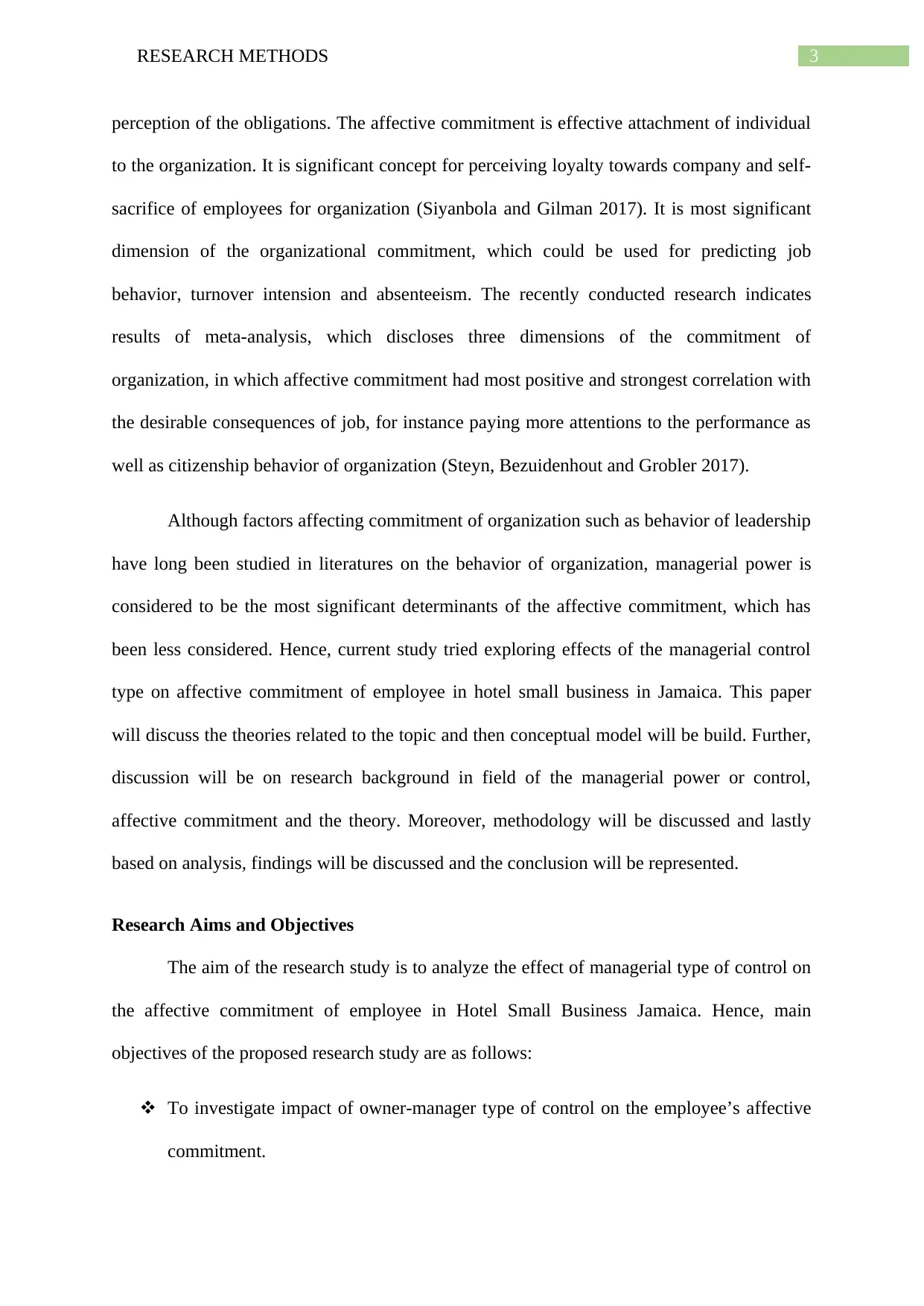
3RESEARCH METHODS
perception of the obligations. The affective commitment is effective attachment of individual
to the organization. It is significant concept for perceiving loyalty towards company and self-
sacrifice of employees for organization (Siyanbola and Gilman 2017). It is most significant
dimension of the organizational commitment, which could be used for predicting job
behavior, turnover intension and absenteeism. The recently conducted research indicates
results of meta-analysis, which discloses three dimensions of the commitment of
organization, in which affective commitment had most positive and strongest correlation with
the desirable consequences of job, for instance paying more attentions to the performance as
well as citizenship behavior of organization (Steyn, Bezuidenhout and Grobler 2017).
Although factors affecting commitment of organization such as behavior of leadership
have long been studied in literatures on the behavior of organization, managerial power is
considered to be the most significant determinants of the affective commitment, which has
been less considered. Hence, current study tried exploring effects of the managerial control
type on affective commitment of employee in hotel small business in Jamaica. This paper
will discuss the theories related to the topic and then conceptual model will be build. Further,
discussion will be on research background in field of the managerial power or control,
affective commitment and the theory. Moreover, methodology will be discussed and lastly
based on analysis, findings will be discussed and the conclusion will be represented.
Research Aims and Objectives
The aim of the research study is to analyze the effect of managerial type of control on
the affective commitment of employee in Hotel Small Business Jamaica. Hence, main
objectives of the proposed research study are as follows:
To investigate impact of owner-manager type of control on the employee’s affective
commitment.
perception of the obligations. The affective commitment is effective attachment of individual
to the organization. It is significant concept for perceiving loyalty towards company and self-
sacrifice of employees for organization (Siyanbola and Gilman 2017). It is most significant
dimension of the organizational commitment, which could be used for predicting job
behavior, turnover intension and absenteeism. The recently conducted research indicates
results of meta-analysis, which discloses three dimensions of the commitment of
organization, in which affective commitment had most positive and strongest correlation with
the desirable consequences of job, for instance paying more attentions to the performance as
well as citizenship behavior of organization (Steyn, Bezuidenhout and Grobler 2017).
Although factors affecting commitment of organization such as behavior of leadership
have long been studied in literatures on the behavior of organization, managerial power is
considered to be the most significant determinants of the affective commitment, which has
been less considered. Hence, current study tried exploring effects of the managerial control
type on affective commitment of employee in hotel small business in Jamaica. This paper
will discuss the theories related to the topic and then conceptual model will be build. Further,
discussion will be on research background in field of the managerial power or control,
affective commitment and the theory. Moreover, methodology will be discussed and lastly
based on analysis, findings will be discussed and the conclusion will be represented.
Research Aims and Objectives
The aim of the research study is to analyze the effect of managerial type of control on
the affective commitment of employee in Hotel Small Business Jamaica. Hence, main
objectives of the proposed research study are as follows:
To investigate impact of owner-manager type of control on the employee’s affective
commitment.
Paraphrase This Document
Need a fresh take? Get an instant paraphrase of this document with our AI Paraphraser
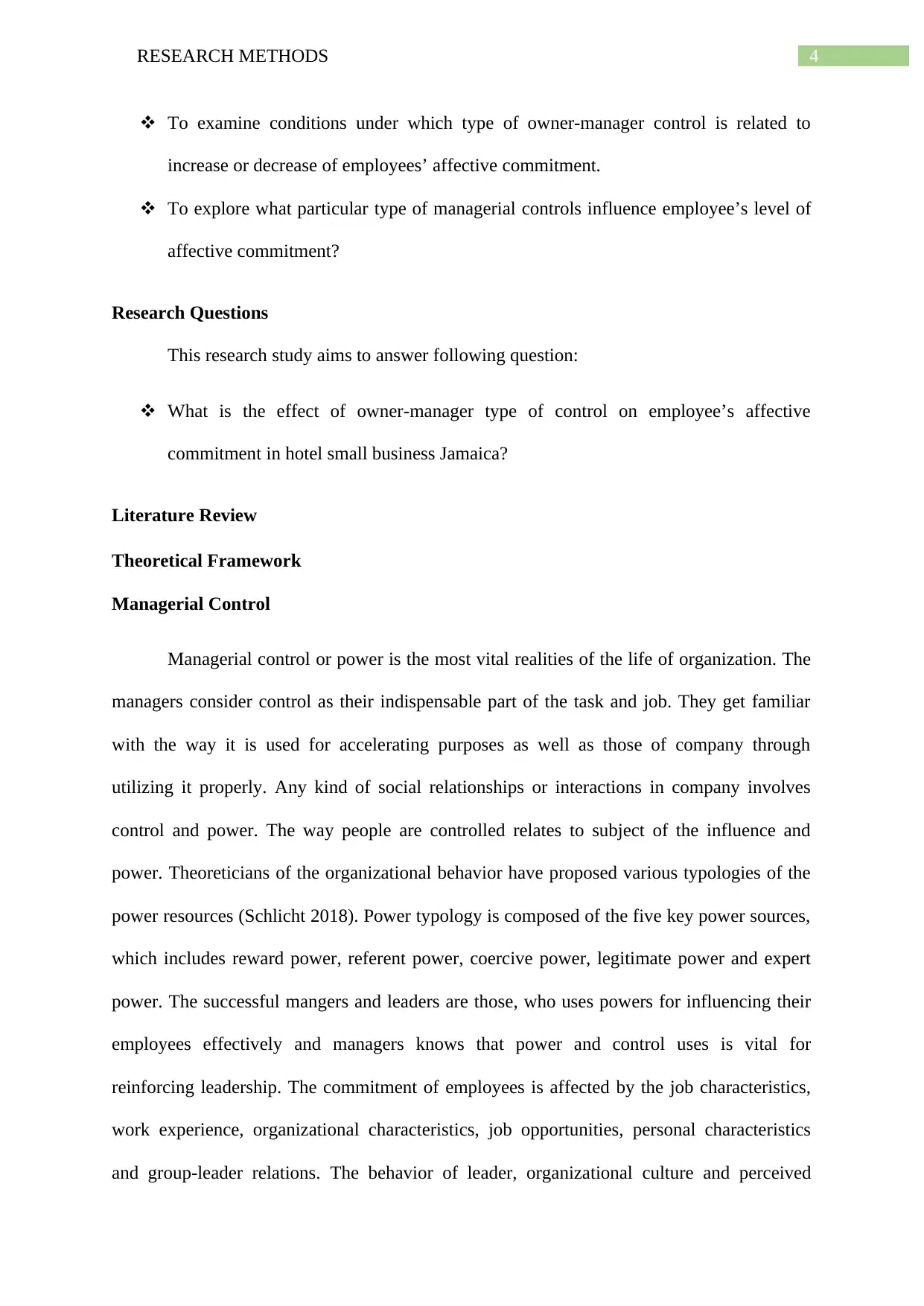
4RESEARCH METHODS
To examine conditions under which type of owner-manager control is related to
increase or decrease of employees’ affective commitment.
To explore what particular type of managerial controls influence employee’s level of
affective commitment?
Research Questions
This research study aims to answer following question:
What is the effect of owner-manager type of control on employee’s affective
commitment in hotel small business Jamaica?
Literature Review
Theoretical Framework
Managerial Control
Managerial control or power is the most vital realities of the life of organization. The
managers consider control as their indispensable part of the task and job. They get familiar
with the way it is used for accelerating purposes as well as those of company through
utilizing it properly. Any kind of social relationships or interactions in company involves
control and power. The way people are controlled relates to subject of the influence and
power. Theoreticians of the organizational behavior have proposed various typologies of the
power resources (Schlicht 2018). Power typology is composed of the five key power sources,
which includes reward power, referent power, coercive power, legitimate power and expert
power. The successful mangers and leaders are those, who uses powers for influencing their
employees effectively and managers knows that power and control uses is vital for
reinforcing leadership. The commitment of employees is affected by the job characteristics,
work experience, organizational characteristics, job opportunities, personal characteristics
and group-leader relations. The behavior of leader, organizational culture and perceived
To examine conditions under which type of owner-manager control is related to
increase or decrease of employees’ affective commitment.
To explore what particular type of managerial controls influence employee’s level of
affective commitment?
Research Questions
This research study aims to answer following question:
What is the effect of owner-manager type of control on employee’s affective
commitment in hotel small business Jamaica?
Literature Review
Theoretical Framework
Managerial Control
Managerial control or power is the most vital realities of the life of organization. The
managers consider control as their indispensable part of the task and job. They get familiar
with the way it is used for accelerating purposes as well as those of company through
utilizing it properly. Any kind of social relationships or interactions in company involves
control and power. The way people are controlled relates to subject of the influence and
power. Theoreticians of the organizational behavior have proposed various typologies of the
power resources (Schlicht 2018). Power typology is composed of the five key power sources,
which includes reward power, referent power, coercive power, legitimate power and expert
power. The successful mangers and leaders are those, who uses powers for influencing their
employees effectively and managers knows that power and control uses is vital for
reinforcing leadership. The commitment of employees is affected by the job characteristics,
work experience, organizational characteristics, job opportunities, personal characteristics
and group-leader relations. The behavior of leader, organizational culture and perceived
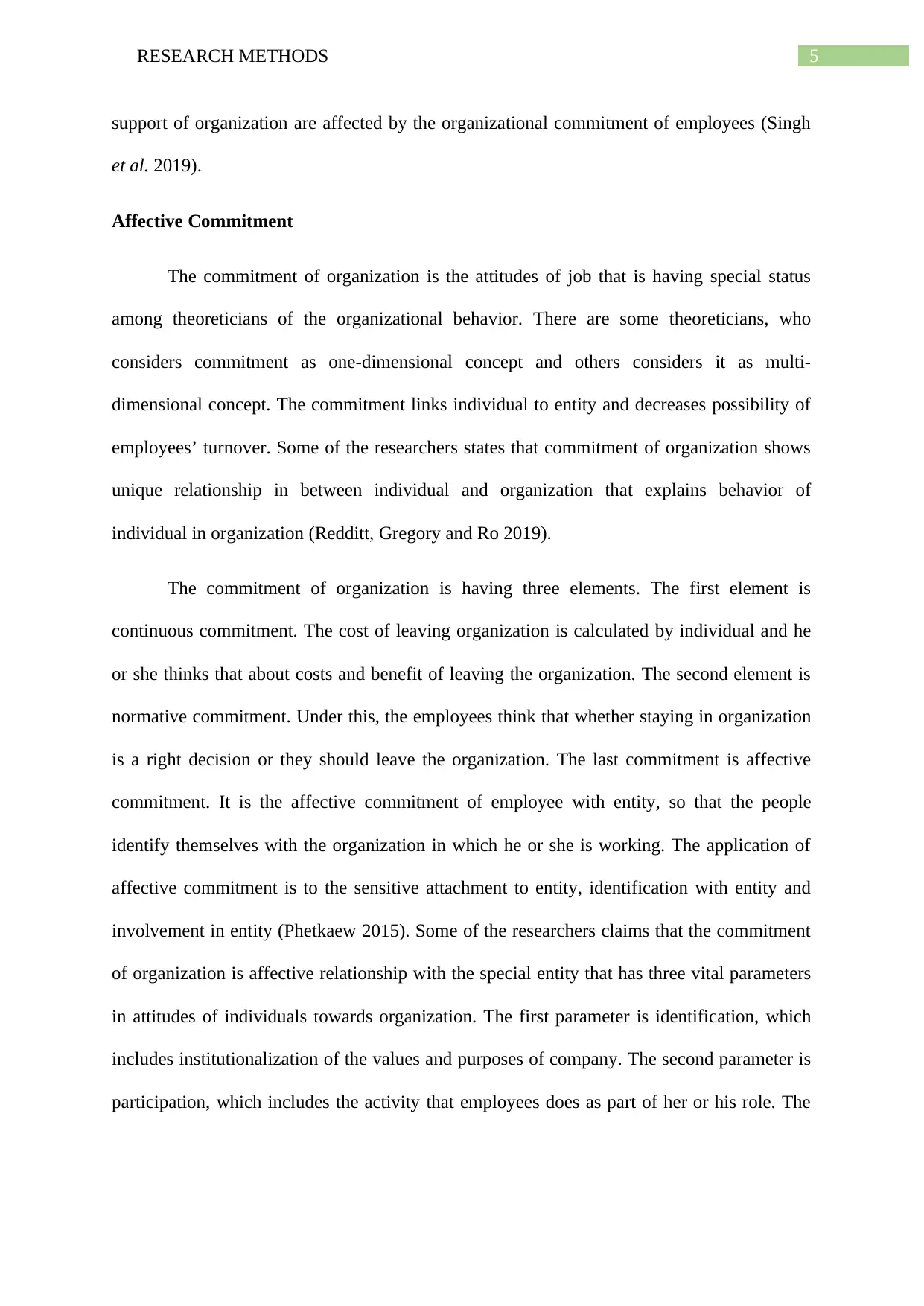
5RESEARCH METHODS
support of organization are affected by the organizational commitment of employees (Singh
et al. 2019).
Affective Commitment
The commitment of organization is the attitudes of job that is having special status
among theoreticians of the organizational behavior. There are some theoreticians, who
considers commitment as one-dimensional concept and others considers it as multi-
dimensional concept. The commitment links individual to entity and decreases possibility of
employees’ turnover. Some of the researchers states that commitment of organization shows
unique relationship in between individual and organization that explains behavior of
individual in organization (Redditt, Gregory and Ro 2019).
The commitment of organization is having three elements. The first element is
continuous commitment. The cost of leaving organization is calculated by individual and he
or she thinks that about costs and benefit of leaving the organization. The second element is
normative commitment. Under this, the employees think that whether staying in organization
is a right decision or they should leave the organization. The last commitment is affective
commitment. It is the affective commitment of employee with entity, so that the people
identify themselves with the organization in which he or she is working. The application of
affective commitment is to the sensitive attachment to entity, identification with entity and
involvement in entity (Phetkaew 2015). Some of the researchers claims that the commitment
of organization is affective relationship with the special entity that has three vital parameters
in attitudes of individuals towards organization. The first parameter is identification, which
includes institutionalization of the values and purposes of company. The second parameter is
participation, which includes the activity that employees does as part of her or his role. The
support of organization are affected by the organizational commitment of employees (Singh
et al. 2019).
Affective Commitment
The commitment of organization is the attitudes of job that is having special status
among theoreticians of the organizational behavior. There are some theoreticians, who
considers commitment as one-dimensional concept and others considers it as multi-
dimensional concept. The commitment links individual to entity and decreases possibility of
employees’ turnover. Some of the researchers states that commitment of organization shows
unique relationship in between individual and organization that explains behavior of
individual in organization (Redditt, Gregory and Ro 2019).
The commitment of organization is having three elements. The first element is
continuous commitment. The cost of leaving organization is calculated by individual and he
or she thinks that about costs and benefit of leaving the organization. The second element is
normative commitment. Under this, the employees think that whether staying in organization
is a right decision or they should leave the organization. The last commitment is affective
commitment. It is the affective commitment of employee with entity, so that the people
identify themselves with the organization in which he or she is working. The application of
affective commitment is to the sensitive attachment to entity, identification with entity and
involvement in entity (Phetkaew 2015). Some of the researchers claims that the commitment
of organization is affective relationship with the special entity that has three vital parameters
in attitudes of individuals towards organization. The first parameter is identification, which
includes institutionalization of the values and purposes of company. The second parameter is
participation, which includes the activity that employees does as part of her or his role. The
⊘ This is a preview!⊘
Do you want full access?
Subscribe today to unlock all pages.

Trusted by 1+ million students worldwide
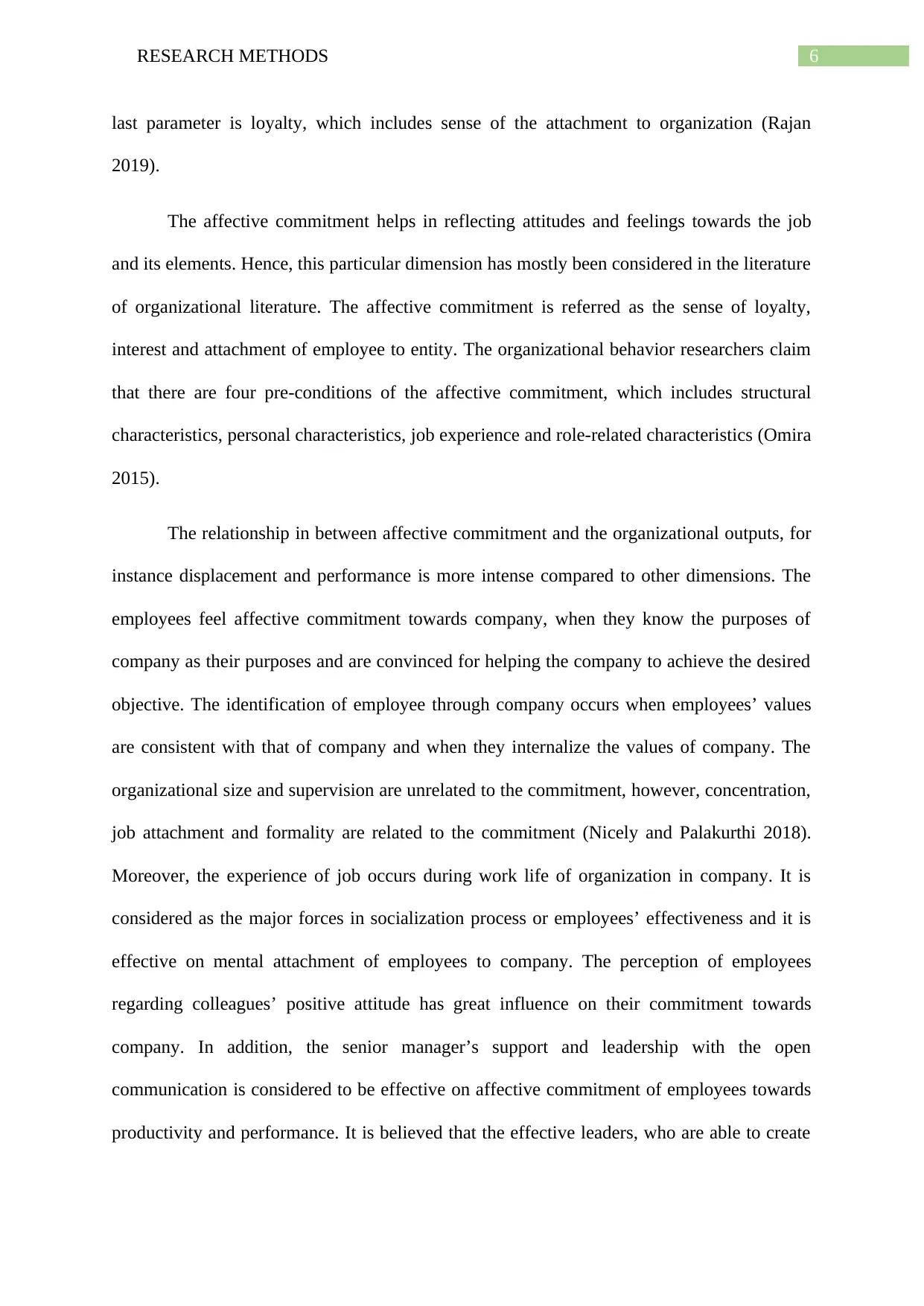
6RESEARCH METHODS
last parameter is loyalty, which includes sense of the attachment to organization (Rajan
2019).
The affective commitment helps in reflecting attitudes and feelings towards the job
and its elements. Hence, this particular dimension has mostly been considered in the literature
of organizational literature. The affective commitment is referred as the sense of loyalty,
interest and attachment of employee to entity. The organizational behavior researchers claim
that there are four pre-conditions of the affective commitment, which includes structural
characteristics, personal characteristics, job experience and role-related characteristics (Omira
2015).
The relationship in between affective commitment and the organizational outputs, for
instance displacement and performance is more intense compared to other dimensions. The
employees feel affective commitment towards company, when they know the purposes of
company as their purposes and are convinced for helping the company to achieve the desired
objective. The identification of employee through company occurs when employees’ values
are consistent with that of company and when they internalize the values of company. The
organizational size and supervision are unrelated to the commitment, however, concentration,
job attachment and formality are related to the commitment (Nicely and Palakurthi 2018).
Moreover, the experience of job occurs during work life of organization in company. It is
considered as the major forces in socialization process or employees’ effectiveness and it is
effective on mental attachment of employees to company. The perception of employees
regarding colleagues’ positive attitude has great influence on their commitment towards
company. In addition, the senior manager’s support and leadership with the open
communication is considered to be effective on affective commitment of employees towards
productivity and performance. It is believed that the effective leaders, who are able to create
last parameter is loyalty, which includes sense of the attachment to organization (Rajan
2019).
The affective commitment helps in reflecting attitudes and feelings towards the job
and its elements. Hence, this particular dimension has mostly been considered in the literature
of organizational literature. The affective commitment is referred as the sense of loyalty,
interest and attachment of employee to entity. The organizational behavior researchers claim
that there are four pre-conditions of the affective commitment, which includes structural
characteristics, personal characteristics, job experience and role-related characteristics (Omira
2015).
The relationship in between affective commitment and the organizational outputs, for
instance displacement and performance is more intense compared to other dimensions. The
employees feel affective commitment towards company, when they know the purposes of
company as their purposes and are convinced for helping the company to achieve the desired
objective. The identification of employee through company occurs when employees’ values
are consistent with that of company and when they internalize the values of company. The
organizational size and supervision are unrelated to the commitment, however, concentration,
job attachment and formality are related to the commitment (Nicely and Palakurthi 2018).
Moreover, the experience of job occurs during work life of organization in company. It is
considered as the major forces in socialization process or employees’ effectiveness and it is
effective on mental attachment of employees to company. The perception of employees
regarding colleagues’ positive attitude has great influence on their commitment towards
company. In addition, the senior manager’s support and leadership with the open
communication is considered to be effective on affective commitment of employees towards
productivity and performance. It is believed that the effective leaders, who are able to create
Paraphrase This Document
Need a fresh take? Get an instant paraphrase of this document with our AI Paraphraser
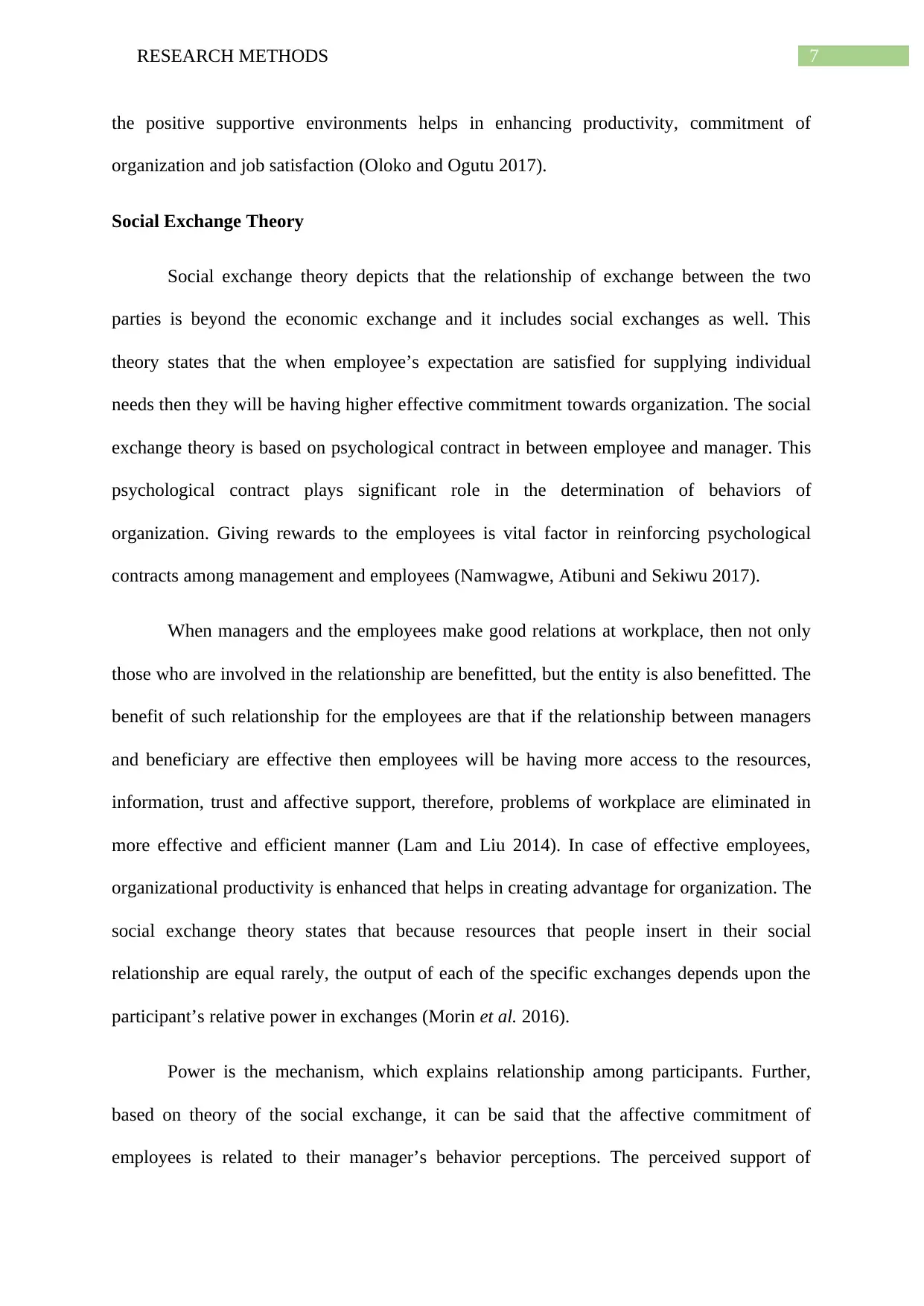
7RESEARCH METHODS
the positive supportive environments helps in enhancing productivity, commitment of
organization and job satisfaction (Oloko and Ogutu 2017).
Social Exchange Theory
Social exchange theory depicts that the relationship of exchange between the two
parties is beyond the economic exchange and it includes social exchanges as well. This
theory states that the when employee’s expectation are satisfied for supplying individual
needs then they will be having higher effective commitment towards organization. The social
exchange theory is based on psychological contract in between employee and manager. This
psychological contract plays significant role in the determination of behaviors of
organization. Giving rewards to the employees is vital factor in reinforcing psychological
contracts among management and employees (Namwagwe, Atibuni and Sekiwu 2017).
When managers and the employees make good relations at workplace, then not only
those who are involved in the relationship are benefitted, but the entity is also benefitted. The
benefit of such relationship for the employees are that if the relationship between managers
and beneficiary are effective then employees will be having more access to the resources,
information, trust and affective support, therefore, problems of workplace are eliminated in
more effective and efficient manner (Lam and Liu 2014). In case of effective employees,
organizational productivity is enhanced that helps in creating advantage for organization. The
social exchange theory states that because resources that people insert in their social
relationship are equal rarely, the output of each of the specific exchanges depends upon the
participant’s relative power in exchanges (Morin et al. 2016).
Power is the mechanism, which explains relationship among participants. Further,
based on theory of the social exchange, it can be said that the affective commitment of
employees is related to their manager’s behavior perceptions. The perceived support of
the positive supportive environments helps in enhancing productivity, commitment of
organization and job satisfaction (Oloko and Ogutu 2017).
Social Exchange Theory
Social exchange theory depicts that the relationship of exchange between the two
parties is beyond the economic exchange and it includes social exchanges as well. This
theory states that the when employee’s expectation are satisfied for supplying individual
needs then they will be having higher effective commitment towards organization. The social
exchange theory is based on psychological contract in between employee and manager. This
psychological contract plays significant role in the determination of behaviors of
organization. Giving rewards to the employees is vital factor in reinforcing psychological
contracts among management and employees (Namwagwe, Atibuni and Sekiwu 2017).
When managers and the employees make good relations at workplace, then not only
those who are involved in the relationship are benefitted, but the entity is also benefitted. The
benefit of such relationship for the employees are that if the relationship between managers
and beneficiary are effective then employees will be having more access to the resources,
information, trust and affective support, therefore, problems of workplace are eliminated in
more effective and efficient manner (Lam and Liu 2014). In case of effective employees,
organizational productivity is enhanced that helps in creating advantage for organization. The
social exchange theory states that because resources that people insert in their social
relationship are equal rarely, the output of each of the specific exchanges depends upon the
participant’s relative power in exchanges (Morin et al. 2016).
Power is the mechanism, which explains relationship among participants. Further,
based on theory of the social exchange, it can be said that the affective commitment of
employees is related to their manager’s behavior perceptions. The perceived support of
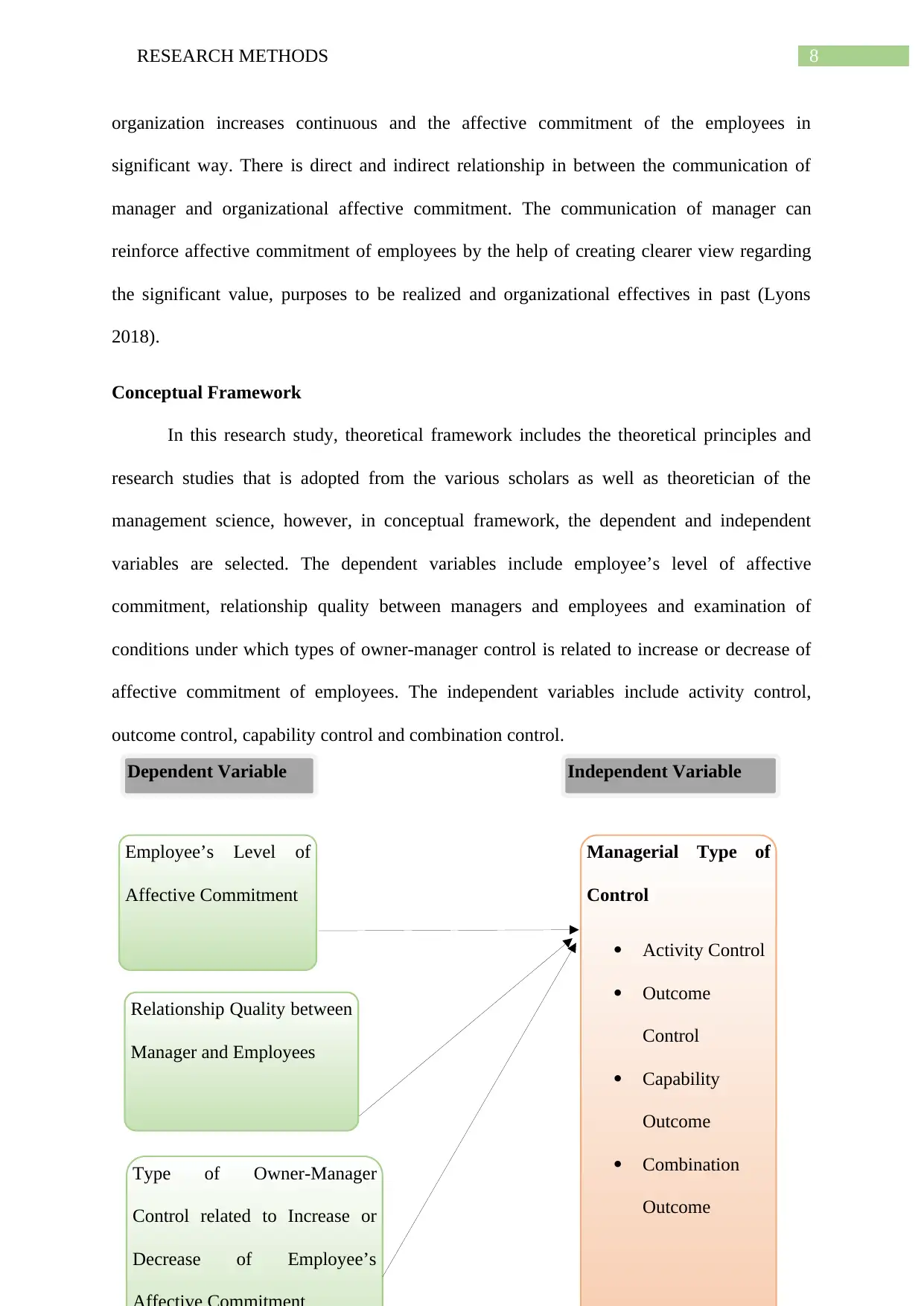
8RESEARCH METHODS
organization increases continuous and the affective commitment of the employees in
significant way. There is direct and indirect relationship in between the communication of
manager and organizational affective commitment. The communication of manager can
reinforce affective commitment of employees by the help of creating clearer view regarding
the significant value, purposes to be realized and organizational effectives in past (Lyons
2018).
Conceptual Framework
In this research study, theoretical framework includes the theoretical principles and
research studies that is adopted from the various scholars as well as theoretician of the
management science, however, in conceptual framework, the dependent and independent
variables are selected. The dependent variables include employee’s level of affective
commitment, relationship quality between managers and employees and examination of
conditions under which types of owner-manager control is related to increase or decrease of
affective commitment of employees. The independent variables include activity control,
outcome control, capability control and combination control.
Dependent Variable Independent Variable
Employee’s Level of
Affective Commitment
Relationship Quality between
Manager and Employees
Type of Owner-Manager
Control related to Increase or
Decrease of Employee’s
Managerial Type of
Control
Activity Control
Outcome
Control
Capability
Outcome
Combination
Outcome
organization increases continuous and the affective commitment of the employees in
significant way. There is direct and indirect relationship in between the communication of
manager and organizational affective commitment. The communication of manager can
reinforce affective commitment of employees by the help of creating clearer view regarding
the significant value, purposes to be realized and organizational effectives in past (Lyons
2018).
Conceptual Framework
In this research study, theoretical framework includes the theoretical principles and
research studies that is adopted from the various scholars as well as theoretician of the
management science, however, in conceptual framework, the dependent and independent
variables are selected. The dependent variables include employee’s level of affective
commitment, relationship quality between managers and employees and examination of
conditions under which types of owner-manager control is related to increase or decrease of
affective commitment of employees. The independent variables include activity control,
outcome control, capability control and combination control.
Dependent Variable Independent Variable
Employee’s Level of
Affective Commitment
Relationship Quality between
Manager and Employees
Type of Owner-Manager
Control related to Increase or
Decrease of Employee’s
Managerial Type of
Control
Activity Control
Outcome
Control
Capability
Outcome
Combination
Outcome
⊘ This is a preview!⊘
Do you want full access?
Subscribe today to unlock all pages.

Trusted by 1+ million students worldwide
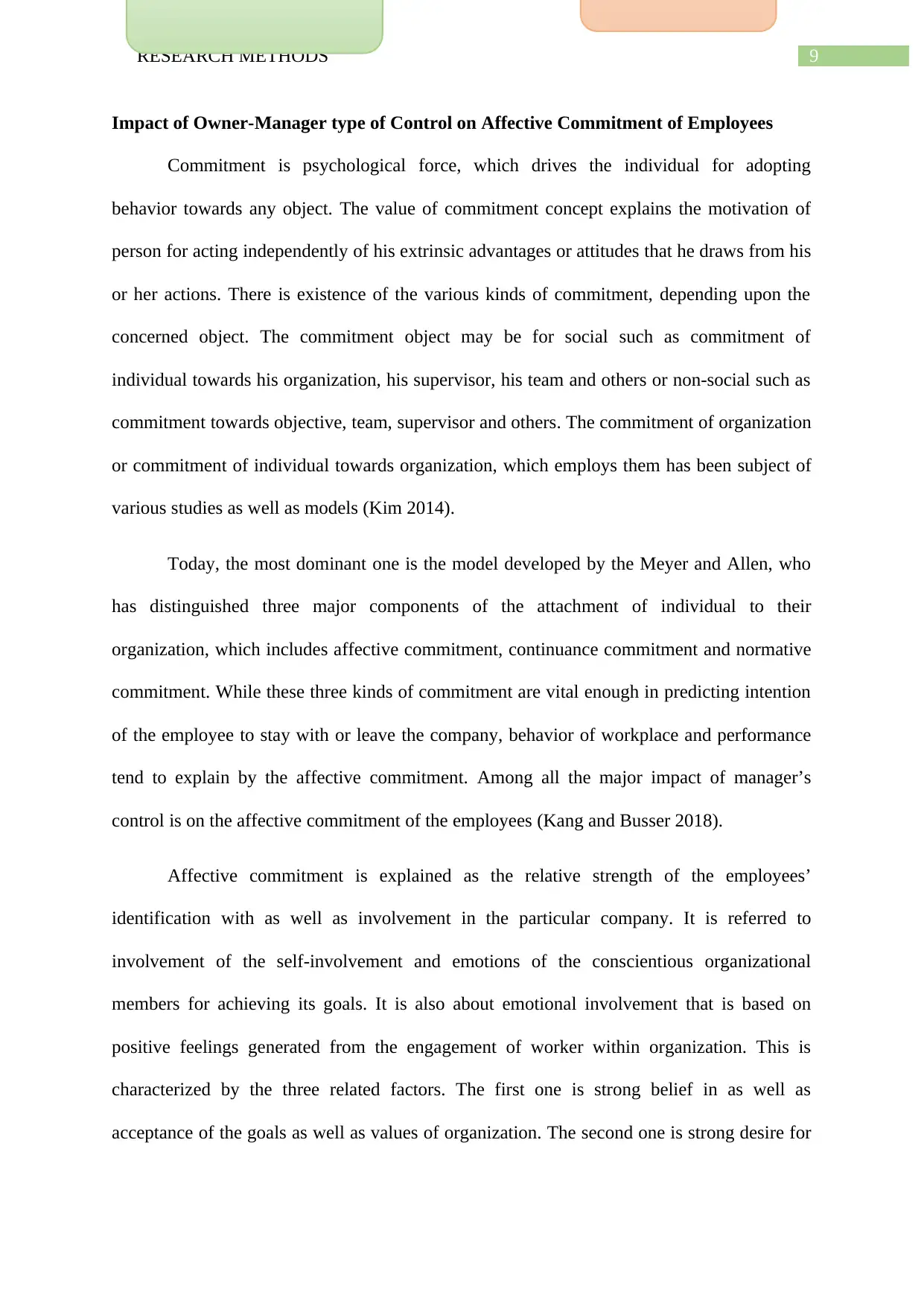
9RESEARCH METHODS
Impact of Owner-Manager type of Control on Affective Commitment of Employees
Commitment is psychological force, which drives the individual for adopting
behavior towards any object. The value of commitment concept explains the motivation of
person for acting independently of his extrinsic advantages or attitudes that he draws from his
or her actions. There is existence of the various kinds of commitment, depending upon the
concerned object. The commitment object may be for social such as commitment of
individual towards his organization, his supervisor, his team and others or non-social such as
commitment towards objective, team, supervisor and others. The commitment of organization
or commitment of individual towards organization, which employs them has been subject of
various studies as well as models (Kim 2014).
Today, the most dominant one is the model developed by the Meyer and Allen, who
has distinguished three major components of the attachment of individual to their
organization, which includes affective commitment, continuance commitment and normative
commitment. While these three kinds of commitment are vital enough in predicting intention
of the employee to stay with or leave the company, behavior of workplace and performance
tend to explain by the affective commitment. Among all the major impact of manager’s
control is on the affective commitment of the employees (Kang and Busser 2018).
Affective commitment is explained as the relative strength of the employees’
identification with as well as involvement in the particular company. It is referred to
involvement of the self-involvement and emotions of the conscientious organizational
members for achieving its goals. It is also about emotional involvement that is based on
positive feelings generated from the engagement of worker within organization. This is
characterized by the three related factors. The first one is strong belief in as well as
acceptance of the goals as well as values of organization. The second one is strong desire for
Impact of Owner-Manager type of Control on Affective Commitment of Employees
Commitment is psychological force, which drives the individual for adopting
behavior towards any object. The value of commitment concept explains the motivation of
person for acting independently of his extrinsic advantages or attitudes that he draws from his
or her actions. There is existence of the various kinds of commitment, depending upon the
concerned object. The commitment object may be for social such as commitment of
individual towards his organization, his supervisor, his team and others or non-social such as
commitment towards objective, team, supervisor and others. The commitment of organization
or commitment of individual towards organization, which employs them has been subject of
various studies as well as models (Kim 2014).
Today, the most dominant one is the model developed by the Meyer and Allen, who
has distinguished three major components of the attachment of individual to their
organization, which includes affective commitment, continuance commitment and normative
commitment. While these three kinds of commitment are vital enough in predicting intention
of the employee to stay with or leave the company, behavior of workplace and performance
tend to explain by the affective commitment. Among all the major impact of manager’s
control is on the affective commitment of the employees (Kang and Busser 2018).
Affective commitment is explained as the relative strength of the employees’
identification with as well as involvement in the particular company. It is referred to
involvement of the self-involvement and emotions of the conscientious organizational
members for achieving its goals. It is also about emotional involvement that is based on
positive feelings generated from the engagement of worker within organization. This is
characterized by the three related factors. The first one is strong belief in as well as
acceptance of the goals as well as values of organization. The second one is strong desire for
Paraphrase This Document
Need a fresh take? Get an instant paraphrase of this document with our AI Paraphraser
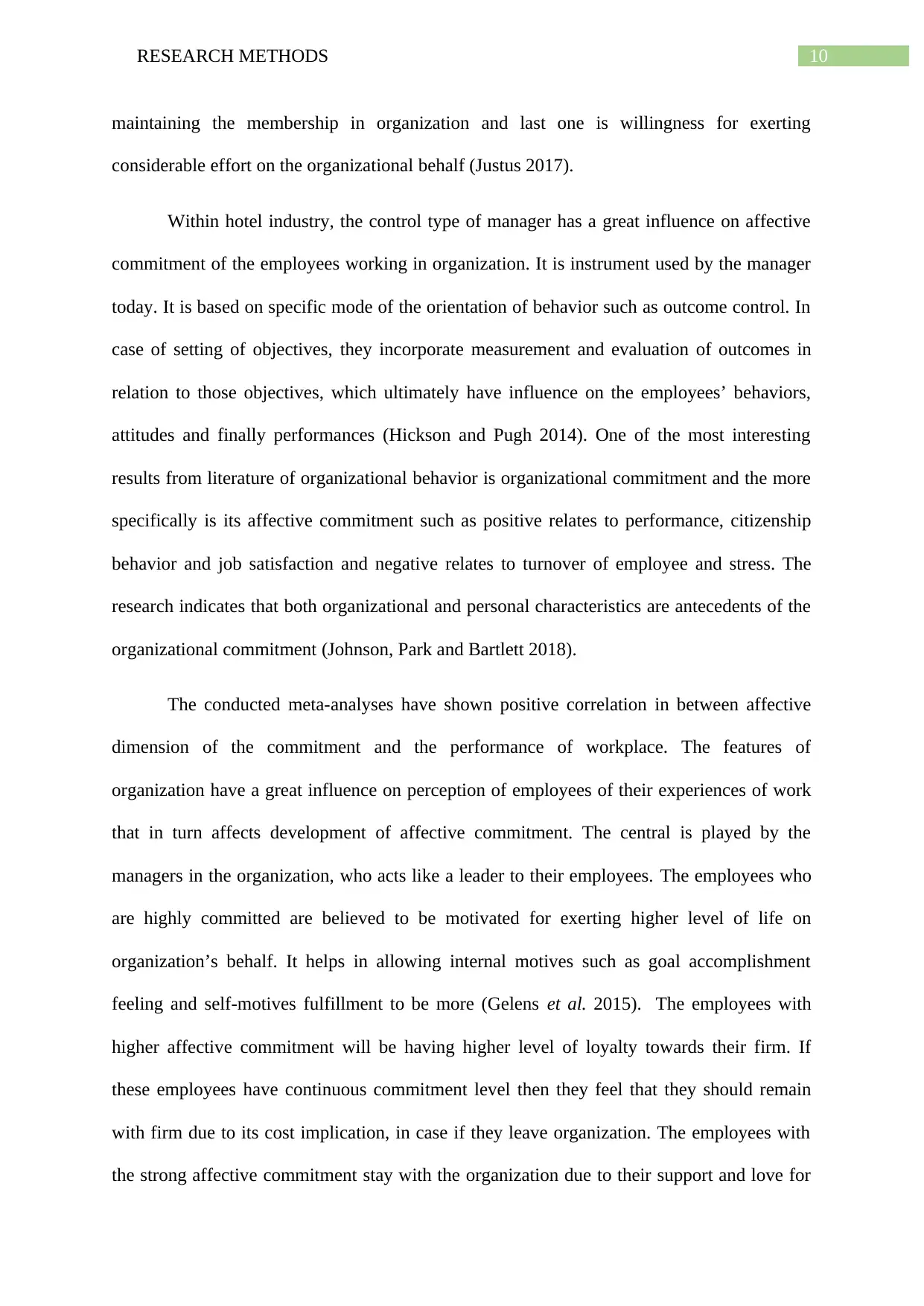
10RESEARCH METHODS
maintaining the membership in organization and last one is willingness for exerting
considerable effort on the organizational behalf (Justus 2017).
Within hotel industry, the control type of manager has a great influence on affective
commitment of the employees working in organization. It is instrument used by the manager
today. It is based on specific mode of the orientation of behavior such as outcome control. In
case of setting of objectives, they incorporate measurement and evaluation of outcomes in
relation to those objectives, which ultimately have influence on the employees’ behaviors,
attitudes and finally performances (Hickson and Pugh 2014). One of the most interesting
results from literature of organizational behavior is organizational commitment and the more
specifically is its affective commitment such as positive relates to performance, citizenship
behavior and job satisfaction and negative relates to turnover of employee and stress. The
research indicates that both organizational and personal characteristics are antecedents of the
organizational commitment (Johnson, Park and Bartlett 2018).
The conducted meta-analyses have shown positive correlation in between affective
dimension of the commitment and the performance of workplace. The features of
organization have a great influence on perception of employees of their experiences of work
that in turn affects development of affective commitment. The central is played by the
managers in the organization, who acts like a leader to their employees. The employees who
are highly committed are believed to be motivated for exerting higher level of life on
organization’s behalf. It helps in allowing internal motives such as goal accomplishment
feeling and self-motives fulfillment to be more (Gelens et al. 2015). The employees with
higher affective commitment will be having higher level of loyalty towards their firm. If
these employees have continuous commitment level then they feel that they should remain
with firm due to its cost implication, in case if they leave organization. The employees with
the strong affective commitment stay with the organization due to their support and love for
maintaining the membership in organization and last one is willingness for exerting
considerable effort on the organizational behalf (Justus 2017).
Within hotel industry, the control type of manager has a great influence on affective
commitment of the employees working in organization. It is instrument used by the manager
today. It is based on specific mode of the orientation of behavior such as outcome control. In
case of setting of objectives, they incorporate measurement and evaluation of outcomes in
relation to those objectives, which ultimately have influence on the employees’ behaviors,
attitudes and finally performances (Hickson and Pugh 2014). One of the most interesting
results from literature of organizational behavior is organizational commitment and the more
specifically is its affective commitment such as positive relates to performance, citizenship
behavior and job satisfaction and negative relates to turnover of employee and stress. The
research indicates that both organizational and personal characteristics are antecedents of the
organizational commitment (Johnson, Park and Bartlett 2018).
The conducted meta-analyses have shown positive correlation in between affective
dimension of the commitment and the performance of workplace. The features of
organization have a great influence on perception of employees of their experiences of work
that in turn affects development of affective commitment. The central is played by the
managers in the organization, who acts like a leader to their employees. The employees who
are highly committed are believed to be motivated for exerting higher level of life on
organization’s behalf. It helps in allowing internal motives such as goal accomplishment
feeling and self-motives fulfillment to be more (Gelens et al. 2015). The employees with
higher affective commitment will be having higher level of loyalty towards their firm. If
these employees have continuous commitment level then they feel that they should remain
with firm due to its cost implication, in case if they leave organization. The employees with
the strong affective commitment stay with the organization due to their support and love for
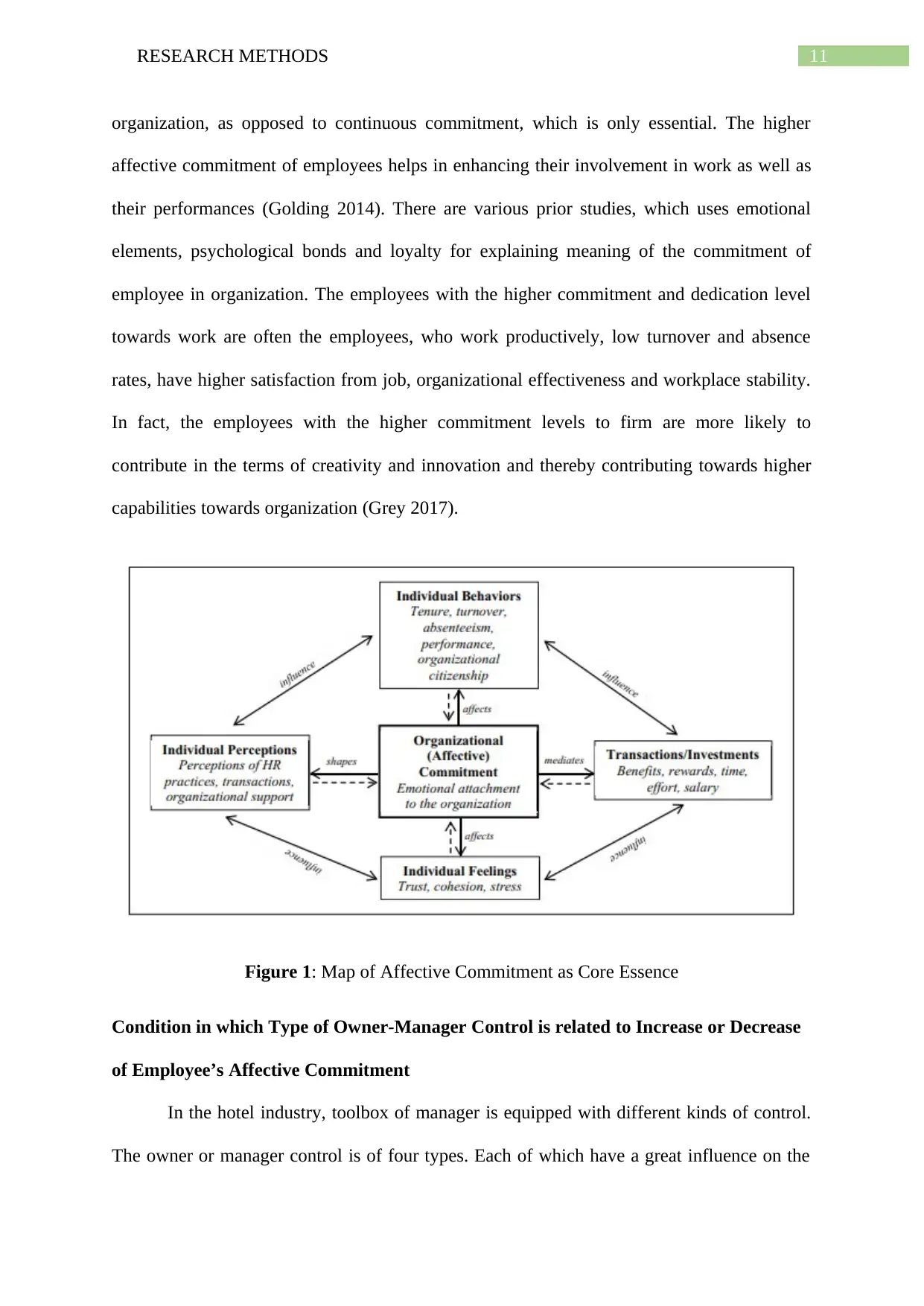
11RESEARCH METHODS
organization, as opposed to continuous commitment, which is only essential. The higher
affective commitment of employees helps in enhancing their involvement in work as well as
their performances (Golding 2014). There are various prior studies, which uses emotional
elements, psychological bonds and loyalty for explaining meaning of the commitment of
employee in organization. The employees with the higher commitment and dedication level
towards work are often the employees, who work productively, low turnover and absence
rates, have higher satisfaction from job, organizational effectiveness and workplace stability.
In fact, the employees with the higher commitment levels to firm are more likely to
contribute in the terms of creativity and innovation and thereby contributing towards higher
capabilities towards organization (Grey 2017).
Figure 1: Map of Affective Commitment as Core Essence
Condition in which Type of Owner-Manager Control is related to Increase or Decrease
of Employee’s Affective Commitment
In the hotel industry, toolbox of manager is equipped with different kinds of control.
The owner or manager control is of four types. Each of which have a great influence on the
organization, as opposed to continuous commitment, which is only essential. The higher
affective commitment of employees helps in enhancing their involvement in work as well as
their performances (Golding 2014). There are various prior studies, which uses emotional
elements, psychological bonds and loyalty for explaining meaning of the commitment of
employee in organization. The employees with the higher commitment and dedication level
towards work are often the employees, who work productively, low turnover and absence
rates, have higher satisfaction from job, organizational effectiveness and workplace stability.
In fact, the employees with the higher commitment levels to firm are more likely to
contribute in the terms of creativity and innovation and thereby contributing towards higher
capabilities towards organization (Grey 2017).
Figure 1: Map of Affective Commitment as Core Essence
Condition in which Type of Owner-Manager Control is related to Increase or Decrease
of Employee’s Affective Commitment
In the hotel industry, toolbox of manager is equipped with different kinds of control.
The owner or manager control is of four types. Each of which have a great influence on the
⊘ This is a preview!⊘
Do you want full access?
Subscribe today to unlock all pages.

Trusted by 1+ million students worldwide
1 out of 25
Related Documents
Your All-in-One AI-Powered Toolkit for Academic Success.
+13062052269
info@desklib.com
Available 24*7 on WhatsApp / Email
![[object Object]](/_next/static/media/star-bottom.7253800d.svg)
Unlock your academic potential
Copyright © 2020–2026 A2Z Services. All Rights Reserved. Developed and managed by ZUCOL.





